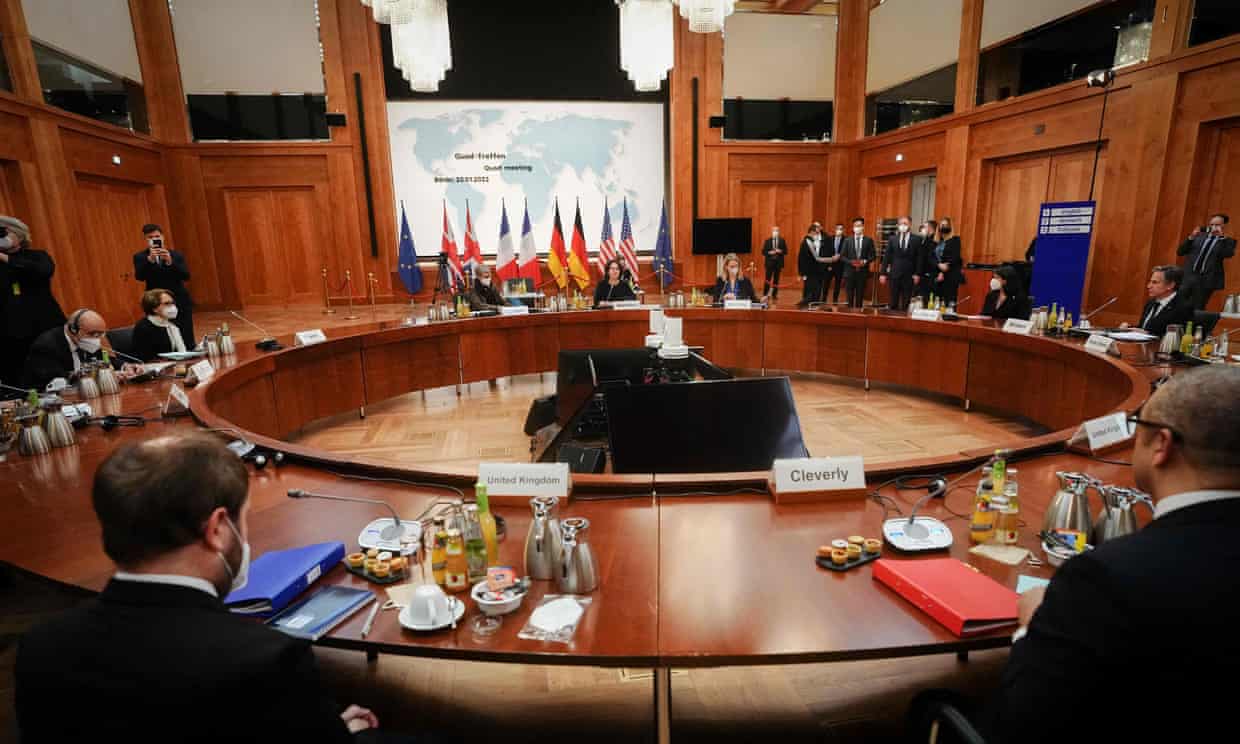Joe Biden confirmed at his press conference on Wednesday what has been apparent for weeks – Nato remains divided over how to respond to Russian aggression against Ukraine.
His admission of a split was overshadowed by his passing remark that a minor incursion would be treated differently to a full-scale invasion. The White House afterwards clarified that a minor incursion meant cyber-attacks, as opposed to a movement of Russian troops into Ukraine sovereign territory.
None of this is academic since Biden said he thought Vladimir Putin would risk an invasion, however much Nato tried to change the Russian president’s calculus with threats.
The greatest tension over the correct response is between the US and Germany, hence the visit of the US secretary of state, Antony Blinken, to Berlin on Thursday before a meeting with Russian officials in Geneva.
Some of the differences are manageable. Neither of the two main sides of the German coalition are willing to sell arms to Ukraine, saying it is longstanding German policy, based on its war experience, not to send weapons into a conflict zone. The current vice-chancellor, Robert Habeck, caused a storm last year when he suggested, against that policy, that the Greens might provide defensive arms, but he beat a fast retreat. By contrast the US, the UK and Turkey do supply arms.
Critics point out that the underlying morality guiding Germany’s approach to arms exports is opaque. According to government figures released on Monday, sales to Egypt boosted Germany’s arms exports to record levels in 2021. Preliminary figures from the Economic Affairs and Climate Action Ministry showed Germany exported arms worth €9.35bn (£7.79bn/$10.65bn) last year – 61% up on 2020. This leaves open the question of why it is acceptable to sell arms to a repressive regime, such as Egypt, but not to a country seeking to avoid repression, such as Ukraine.
On the issue of energy dependency, the tensions are deeper. A compromise reached last summer between the US and Angela Merkel, reaffirmed this week by her successor as chancellor, Olaf Scholz, implies that the Nord Stream 2 pipeline built to carry gas from Russia to Germany will be affected if an invasion happens.
In the absence of an invasion, the Greens and the Social Democrats (SPD) have for now parked their differences by waiting to see if the pipeline receives regulatory approval in Germany and the EU. The SPD want it to go ahead and the Greens do not, but the German approach – not just in the SDP, the home of detente – may be shifting. A letter from more than 73 eastern Europe security experts in Die Zeit urged Germany to end its three-decade policy of standing by in the face of Russian aggression.
Solely in deference to Germany, Biden has worked hard with Democratic senators to prevent them backing sanctions now, but the issue is still live in US politics, and patience with Germany among Republicans is thin.
Separately there has been a dispute about whether Russia can be detached from SWIFT, the international payments system. Some of this is a technical dispute about the legality and effectiveness of the action, and voices do not all go one way. Katarina Barley, a vice-president of the European parliament and member of Germany’s Social Democrats, for instance, is a supporter.
But the fact that the EU does not want to meet formally to discuss sanctions in advance suggests it wants to avoid a row.
The risks of fracture stretch beyond individual punishments to the wider principle of the extent to which the EU should be running an independent Russia policy.
The Americans have undoubtedly made strenuous efforts to involve European capitals. But on Wednesday the French president, Emmanuel Macron, once again raised the principle of not just an independent EU security policy, but explicitly an independent European policy towards Russia – something he has proposed before, to little effect in Moscow.
His proposal blindsided the European commission and led to frantic reassuring calls to the Americans.
This is a familiar French refrain, but if the US finds it dispiriting, it should review the wisdom of going behind France’s back to sign the Aukus nuclear submarine deal to confront China in September, leaving France humiliated. In diplomacy, loyalty has to be earned, not just demanded.
By: Patrick Wintour
Source: Guardian



